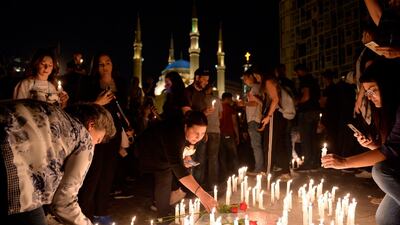There will be more danger ahead for the Lebanese uprising. Iran’s proxies will continue to orchestrate a dispersal of the protests by force or attrition and fulfill their promises to their leadership. On the surface, Tehran says the revolution is not against Hezbollah but corruption. In reality, however, it is well aware that the uprising has Hezbollah in its crosshairs as well as the government. The militant group cannot escape accusations of corruption and demands for accountability. Hezbollah itself has declared its allegiance to Iran’s supreme leader and admitted that its funds and hardware are supplied by Tehran. Tehran has decided not only to prevent Hezbollah from falling at any cost but has told its allies in Moscow it intends to use the current situation in Lebanon to increase Hezbollah’s power, even if it requires force. Iran sees Lebanon as an important arena in the duel with Washington and will not sacrifice its prize, no matter the cost.
The multi-generational revolution in Lebanon against the corrupt political class is in danger. It has a regional behemoth as an adversary, which will not allow it to stand in the way of its projects or undermine its gains. It is therefore imperative for the uprising to take stock of regional and international dynamics, develop tactical and strategic steps to ensure its survival, capitalise on its gains and achieve its demands gradually and consistently. The revolution must not be extinguished as the so-called axis of resistance wishes it to be. If it truly is a revolution, then it will be a long, difficult and bloody march. Its first martyr has already been claimed: Alaa Abou Fakher, killed by a bullet that made him an icon.
Washington of course welcomes the uprising as a benefit to its policy of tightening the noose around Hezbollah and expanding sanctions against the party. However, this is a patriotic, homegrown revolution.
Russia’s leadership has so far sided with the ruling class. At the Paris Peace Forum, foreign minster Sergey Lavrov dismissed a key demand of the uprising, namely to form a technocratic government with no career politicians, saying it was “unrealistic”. He expressed implicit support for Hezbollah’s position of forming a government of politicians combined with technocrats.
According to Russian sources, Moscow sees the discord in Lebanon as a threat to its efforts to stabilise Syria, where it faces a complex mission with no guarantee of success. It sees Hezbollah and Iran as easier to deal with than the Lebanese army, say the sources. Perhaps it is Washington’s ties with the army that frustrate Moscow but there is a risk that in supporting Iran’s influence in Lebanon, Russia is jeopardising Lebanon’s sovereignty.
The sources revealed Tehran had given Moscow promises to pacify the situation and restore normality to the country by putting an end to the protests, adding that instability in Lebanon was not in the Russian interest.
The axis of resistance has claimed it now commands a bigger bloc of supporters than the protesters. But such a bloc of people would not represent either Lebanon’s independence or its national army. Lebanese President Michel Aoun, who has long spoken of his support for the national army, is today hostage to his affiliation to the axis. Indeed, by condoning the Iranian project in Lebanon, he has undermined his own country’s sovereignty and the army he once led. Iran and Hezbollah do not want to allow the national army to lead so the president must remember his oath of allegiance instead of being a silent witness to the attack on his country by Iran.
The president must also apologise for saying the Lebanese should emigrate if they are unhappy with his rule. He must reassure his people that he is not simply a puppet of the axis of resistance and do everything he can to restore confidence and prevent the Islamic Revolutionary Guard Corps in Iran from turning a peaceful uprising into a bloody confrontation.
Washington is determined to choke Iran and its proxies economically to force it to adjust its behaviour in issues such as its nuclear and ballistic missile programme and its regional expansionist projects in Arab countries. Hezbollah is the most successful implementation of that model.
Lebanon has become an arena for the Iranian regime's battle for influence and survival. This regime sees uprisings as a threat to its projects, even when they are primarily challenging corruption. Washington, meanwhile, sees Lebanon as a key factor in its bid to block Iran's schemes. Iran is now vulnerable in Iraq, Syria and Yemen as well as at home, where protests are beginning to erupt against the regime's authoritarianism, and the hardship and isolation that have resulted from successive rounds of US sanctions.
In view of this equation, the Lebanese army is the country’s safety valve. If the president chooses Lebanon over Iran, he must not fear the social media-fuelled protests and instead forgo his political alliances. Otherwise he will be bound in the service of Iran.


